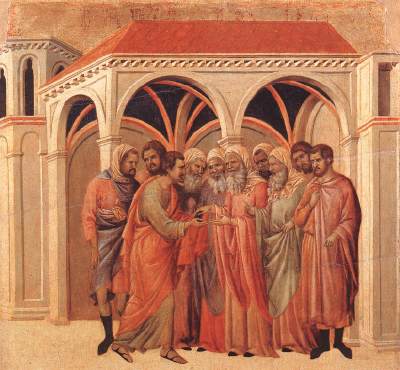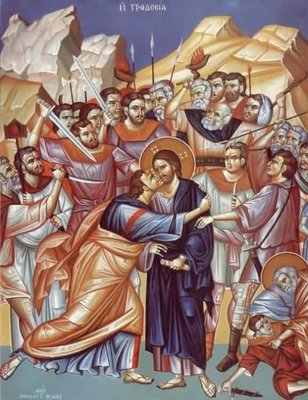Judas, with avaricious thoughts, ponders, plots and accepts the darkness
The progression of sin into self-imposed slavery
Holy Tuesday
2011
 In the name of the Father, the Son and the Holy Spirit, Amen.
In the name of the Father, the Son and the Holy Spirit, Amen.
Today we heard about the mechanism of sin, how sin begins to devour us if we allow it to.
We heard a sessional hymn about Judas and about how he ended up being annihilated by his thoughts. This hymn is a good description of how we become enslaved to sin. Especially these first three days of Holy Week there's a lot of introspection and a lot of consideration of our sinfulness. We are comparing ourselves in other hymns with the fig tree. We have the ten virgins, the story which is read in Presanctified for Tuesday. We have lots of hymns which really speak about our weakness and beg the Lord to help us and compare ourselves to some of these bad actors that are in the Scripture.
So I'll read this sessional hymn to you again and then make a couple of quick comments.
"Impious Judas with avaricious thoughts plots against the Master, and ponders how he will betray Him. He falls away from the light and accepts the darkness; he agrees upon the payment and sells Him that is above all price; and as the reward of his actions, in his misery he receives a hangman's noose and death in agony. O Christ our God, deliver us from such a fate as his, and grant remission of sins to those who celebrate with love Thy most pure passion."
For Judas, his fatal passion was avaricious thoughts. Saint John says that he had the money bag and he liked to steal from it. And so this was a long-standing passion of his. It wasn't something that was just for the moment; it was long-standing. And so because of this addiction to a particular sin – it could be lust or jealousy or gossip or judging people, or many different things, he was eventually annihilated by his passion.
Because of this sin, this long-standing addiction, he started thinking about a way to have more money, and he pondered. He thought about it, how he might betray Christ.
Probably in the beginning when he thought about it, it was revolting to him: No, he couldn't do that. He's been a friend for three years. Because, after all, Judas did raise the dead and heal people too, you know. I don't know if he raised the dead, it’s not given, but he was one of the ones who went out and healed people. And so there must have been some attachment to Christ, but there was a greater attachment to money. And so what does it say? He falls away from the light and he accepts the darkness.
If you read monastic literature, you will see that this is indicating how sin progresses in us. It begins with a thought, and then we ponder it and then we accept it. Now, in the case of some sins, if we are able to most of the time be victorious over them, they don't possess us. But in the case of Judas, avariciousness had already possessed him. And so what did he do? He became possessed by murder. He accepted the darkness.
 Now, really, all of us have things that are calling out to us like the sirens that want us to accept them. And we must fight against them. And this warfare that is so necessary in a Christian is spoken about many times in the days of Holy Week. There's a reason for that. Palm Sunday you must think about this warfare.
Now, really, all of us have things that are calling out to us like the sirens that want us to accept them. And we must fight against them. And this warfare that is so necessary in a Christian is spoken about many times in the days of Holy Week. There's a reason for that. Palm Sunday you must think about this warfare.
Father Nicholas gave a homily that really spoke about something that is related to this warfare. People had a view of Christ that He wasn't, and they allowed this view to possess them. They wanted a king, a conqueror, someone to rub the nose of Rome in the dirt. That's not what they were getting. They were getting someone meek, lowly, who sat on a colt, the foal of an ass.
There are many things in our lives that want to possess us, brothers and sisters, it's absolutely true, and they want us to accept them. Of course I'm personifying passions. They are not really people, nor are they demons. They are our own weaknesses. Of course, the demons act upon those weaknesses. May God help us to understand this progression and to stop it with repentance. A big part of Holy Week is understanding this progression and learning to stop it.
May God bless you and help you in all things. Amen.
Transcribed by the hand of the handmaiden of God Helen.
Priest Seraphim Holland 2011.
This and other Orthodox materials are available in from:
St. Nicholas Orthodox Church, McKinney, Texas
· Mailing Address: Box 37, McKinney, TX 75070
· Rectory Phone: 972/529-2754
· Email: seraphim@orthodox.net
· Web Page: http://www.orthodox.net
· Redeeming the Time Blog: http://www.orthodox.net/redeemingthetime/
This homily is at:
http://www/.orthodox.net/redeemingthetime
Archive of commentaries: http://www.orthodox.net/scripture
Archive of homilies: http://www.orthodox.net/sermons
To receive regular mailings of sermons, and scriptural and services commentary and other things throughout the church year, read our blog “Redeeming the Time” (http://www.orthodox.net/redeemingthetime). You may also subscribe to the RSS Feed or receive its postings by email.
Our parish Email list (http://groups.google.com/group/saint-nicholas-orthodox-church) also has all the latest postings from our website and blog; everyone is welcome to join.
All rights reserved. Please use this material in any edifying reason. We ask that you contact St. Nicholas if you wish to distribute it in any way. We grant permission to post this text, if completely intact only, including this paragraph and the URL of the text, to any electronic mailing list, church bulletin, web page or blog.